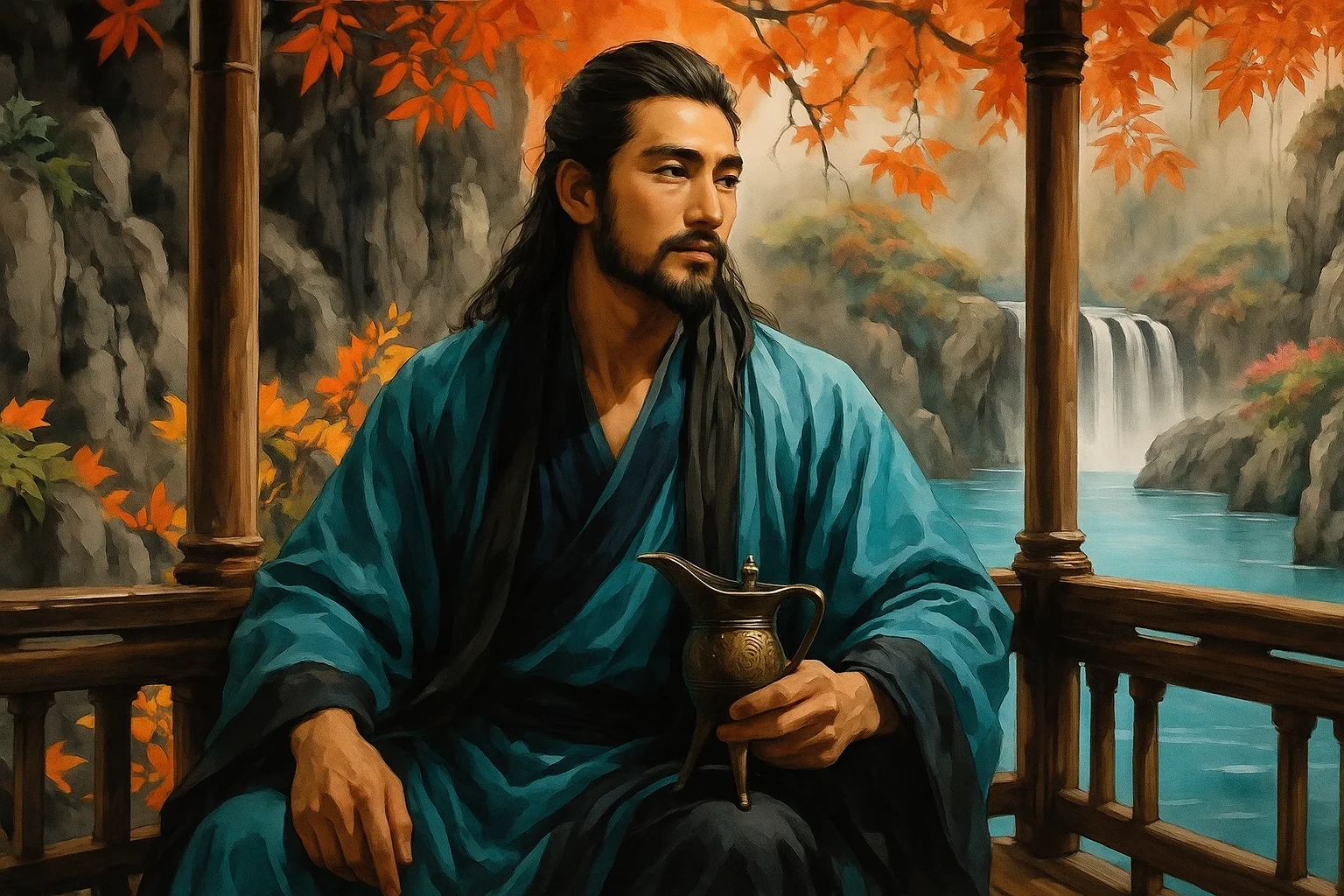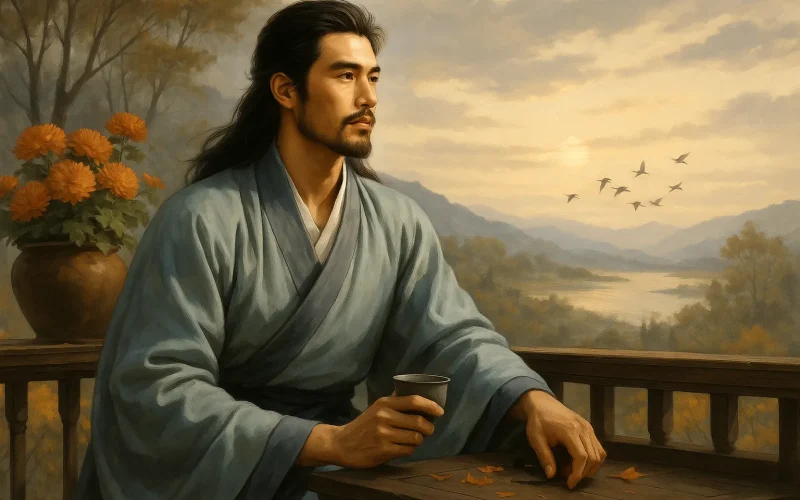"Sing!" they urge, raising cups—but my heart is tired;
I mourn not flowers, but youth that has expired.
Late blooms, their cold fragrance ignored by fall—
Yet still I linger,
Leaning on rails, drowned in sorrow’s endless thrall.
I long to send word with southbound geese in flight,
But regret no message flew with swallows paired.
A lone branch—too far to reach the one I miss.
Empty tower, empty gaze—
Till longing shreds my sight to threads of despair.
Original Poem
「渔家傲 · 对酒当歌劳客劝」
对酒当歌劳客劝。惜花只惜年华晚。
寒艳冷香秋不管。情眷眷。凭栏尽日愁无限。思抱芳期随寒雁。悔无深意传双燕。
欧阳修
怅望一枝难寄远。人不见。楼头望断相思眼。
Interpretation
This lyric, composed during Ouyang Xiu's later years (exact date uncertain), reveals the profound melancholy beneath his eminent official status. Having weathered political storms including the failed Qingli Reforms, the aging poet here gives voice to the isolation that often accompanies worldly success. Through wine, withered flowers, and distant gazing, the work articulates both personal regret and unfulfilled longing with characteristic Northern Song restraint.
First Stanza: "对酒当歌劳客劝。惜花只惜年华晚。寒艳冷香秋不管。情眷眷。凭栏尽日愁无限。"
Duì jiǔ dāng gē láo kè quàn. Xī huā zhǐ xī nián huá wǎn. Hán yàn lěng xiāng qiū bù guǎn. Qíng juàn juàn. Píng lán jìn rì chóu wú xiàn.
Wine cups raised, friends urge me to sing—
I mourn not fading blooms but late years they bring.
Cold-proud flowers scent the uncaring fall,
While my clinging thoughts
At the rail all day
With boundless sorrow cling.
The stanza constructs a poignant contrast between human temporality and nature's indifference. The "cold-proud flowers" (寒艳) bloom autonomously, their perfume mocking mortal concerns, while the poet's "clinging thoughts" (情眷眷) remain tethered to the balcony's rail—an architectural anchor for unmoored emotions. The friends' urging (劳客劝) highlights the solitude that persists even in company.
Second Stanza: "思抱芳期随寒雁。悔无深意传双燕。怅望一枝难寄远。人不见。楼头望断相思眼。"
Sī bào fāng qī suí hán yàn. Huǐ wú shēn yì chuán shuāng yàn. Chàng wàng yī zhī nán jì yuǎn. Rén bù jiàn. Lóu tóu wàng duàn xiāng sī yǎn.
*My longed-for reunion flies south with winter's geese,*
Regret lingers—why not entrust my heart to spring's paired swallows?
In vain I gaze at this broken branch—who would receive it now?
No trace remains—
From this lonely tower my yearning eyes
Strain after shadows where no shadows allow.
The stanza unfolds as a symphony of failed connections: the winter geese (寒雁) carry hopes that will never land, while the absent spring swallows (双燕) represent missed opportunities for emotional expression. The "broken branch" becomes a triple symbol—of fractured communication, unfulfilled artistic expression, and the poet's own fragmented heart. The tower (楼头), traditionally a place of vantage, here becomes a prison for the gaze, its height only emphasizing the impossibility of connection. The final image of "shadows where no shadows allow" suggests the ultimate dissolution of both the beloved's presence and the poet's own capacity to perceive hope.
Holistic Appreciation
The poem begins with wine as a catalyst, unfolding layers of melancholy that transition from springtime vitality to autumnal desolation, then from nostalgic musings to the anguish of unrequited longing. This creates an emotional journey moving through "wine—yearning—remembrance—aching gaze." The poet masterfully blends the sorrow of aging, the pain of unspoken affection, and the torment of endless waiting through symbolic imagery—flowers, wild geese, swallows, railings, and towers. Profound yet restrained, the poem conveys deep emotion without explicit declaration. The first stanza paints sorrow through veiled scenery, while the second reveals tender longing through narrative, culminating in the heart-wrenching line, "gazing from the tower till my lovesick eyes grow dim," leaving an echo of lingering sorrow.
Artistic Merits
The poem's most striking feature is its seamless fusion of emotion and imagery, densely layered symbolism, and progressive emotional intensity. Classic motifs—"flowers," "wild geese," "swallows," "railings," "towers"—construct a richly textured emotional landscape. The language is subtle and graceful, yet each line carries weight, as in "autumn pays no heed" and "gazing till my lovesick eyes grow dim," striking straight to the heart. Structurally, it moves from wine to emotion, scene to sentiment, with taut rhythm and natural emotional escalation, showcasing Ouyang Xiu's mastery of the wanyue (婉约, graceful restraint) style. Its emotional expression embodies the introspective, understated, and poignant aesthetic spirit of Song dynasty poetry.
Insights
This poem teaches us that profound longing can be conveyed through quiet sorrow, and intense emotion can be mirrored in stark imagery. It reminds us: life inevitably brings disappointment and yearning, but when powerless to change circumstances, we can learn to channel our feelings into art and verse. Whether mourning lost time or an unreachable beloved, deep affection need not be clamorous—a single line like "gazing till my lovesick eyes grow dim" can move hearts profoundly. Through this refined and restrained approach, Ouyang Xiu shows us: true emotion often speaks in silence, often lingers in helplessness, yet resonates most powerfully.
About the Poet

Ouyang Xiu (欧阳修, 1007 - 1072), a native of Yongfeng, Jizhou (present-day Jiangxi Province), emerged as the preeminent literary figure of the Northern Song Dynasty. After attaining the jinshi degree in 1030, he spearheaded a literary reform movement that rejected the ornate Xikun style prevalent at court. As a mentor who nurtured literary giants like Su Shi and Zeng Gong, he laid the foundation for the golden age of Northern Song literature. Recognized as one of the "Eight Great Prose Masters of Tang and Song," Ouyang stands as the pivotal figure in the transformation of Northern Song literary culture.












